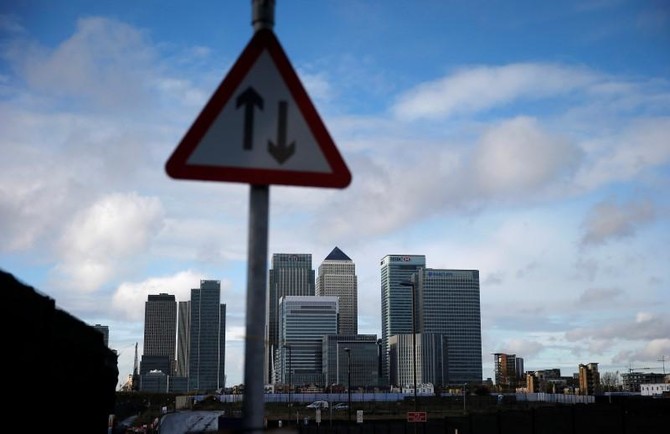LONDON: The Bank of England will allow European banks to continue operating without creating expensive subsidiaries after Brexit, the BBC reported, the opening gambit in a tussle with the EU over London’s position as a top global financial hub.
The BoE’s decision, if confirmed, would mean European banks offering wholesale services would not face new hurdles to operating in London after Britain leaves the European Union in March 2019.
A BoE spokesman declined to comment on the report ahead of the publication at 1300 GMT of the central bank’s approach to future supervision of foreign banks, insurers and clearing houses.
By allowing EU banks to function as normal, the BoE’s announcement represents the first salvo in an expected struggle with the EU over banking rules that will decide the fate of London’s lucrative financial center for decades to come.
The central bank’s proposal indicates a much softer British position than that of the EU, which insists London-based banks will lose access to EU banking markets after Brexit and wants to pull some key banking business back.
London vies with New York for the title of the world’s financial capital, dominates the $5.1-trillion-a-day global foreign exchange market and is home to more banks than any other center.
But many other EU capitals see London’s Brexit tumult as an opportunity to grab new business.
Countries such as France, Germany and Ireland are wooing banks based in London to move operations to them after Brexit.
Earlier this year, BoE Governor Mark Carney called for Britain and the EU to recognize each others’ bank rules after Brexit, or risk a potentially damaging hit to financial services across Europe where many companies depend on London for funding.
The EU’s top Brexit negotiator Michel Barnier this week reiterated his stance that London stands to lose access to the EU banking market if it sticks to its plan to impose new controls on migration, one of the conditions for membership of the single market.
The EU has already proposed that clearing of euro-denominated derivatives, which are done mainly in London, could move to the euro zone after Brexit, if there is no comprehensive Brexit deal between EU and UK regulators.
The tough EU line on banking is extremely sensitive for the United Kingdom which collects over £70 billion (SR351.07 billion) a year in tax from the financial services sector.
So far, British Prime Minister Theresa May has largely conceded to the EU on the structure, timetable and substance of the negotiations.
A later version of the BBC story removed a reference to the BoE proposing that EU banks would be allowed to operate as usual even if no divorce deal was struck between London and Brussels.
The BoE’s proposal indicates both Britain’s concern to preserve London as by far the biggest global banking center in its time zone but also worry about the potential regulation that the EU could impose on banks after Brexit.
May has said Britain will leave the EU’s single market, raising questions about how companies in Britain will do business in the bloc after Brexit, and how European companies can operate in Britain.
The City of London welcomed the BoE’s move.
“Allowing European wholesale banks to operate as normal in the UK after March 2019 is a welcome bit of news to end the year for the City,” said Catherine McGuinness, the head of the City of London Corporation.
The BoE move could also be a gesture of goodwill aimed at softening European Commission plans, due to be published on Wednesday, to stiffen the rules for non-EU investment banks which operate inside the bloc.
Many of those banks, like Goldman Sachs and Morgan Stanley have their main European operations in London at present, though they are making plans to move some operations to EU centers.
The BoE has said around 10,000 financial services jobs are likely to move out of the UK immediately after Brexit in March 2019. Bankers say more may follow in the years ahead.
More than 100 banks operating in London are branches of lenders headquartered elsewhere in the EU. Currently, they operate in Britain under EU “passporting” rules which are due to expire when Britain leaves the bloc in March 2019.
The BoE had previously said it would let banks know before the end of the year whether these branches must reapply for branch licenses to operate after Brexit, or would need to be turned into subsidiaries, an option Boston Consulting Group has said could cost banks up to €40 billion.
Switching from being a branch to a subsidiary means having to build up buffers of capital and cash locally, and come under the direct supervision of the Bank of England.
EU retail banks that hold UK customer deposits above a certain threshold would have to become subsidiaries, the BoE has already said.
BoE to allow EU banks to operate in UK as normal after Brexit, BBC reports
BoE to allow EU banks to operate in UK as normal after Brexit, BBC reports

Saudi-built AI takes on financial crime

- Mozn’s FOCAL reflects the Kingdom’s growing fintech ambitions
RIYADH: As financial institutions face increasingly complex threats from fraud and money laundering, technology companies are racing to build systems that can keep pace with evolving risks.
One such effort is FOCAL, an AI-powered compliance and fraud prevention platform developed by Riyadh-based enterprise artificial intelligence company Mozn.
Founded in 2017, Mozn was established with a focus on building AI technology tailored to regional market needs and regulatory environments. Over time, the company has expanded its reach beyond Saudi Arabia, developing advanced AI solutions used by financial institutions in multiple markets. It has also gained international recognition, including being listed among the World’s Top 250 Fintech Companies for the second consecutive year.
In January 2026, Mozn’s flagship product, FOCAL, was named a Category Leader in Chartis Research’s RiskTech Quadrant 2025 for both AML Transaction Monitoring and KYC (Know Your Customer) Data and Solutions, placing it among 10 companies globally to receive this designation.
Malik Alyousef, co-founder of Mozn and chief technology officer of FOCAL, told Arab News that the platform initially focused on core anti-money laundering functions when development began in 2018. These included customer screening, watchlists, and transaction monitoring to support counter-terrorism financing efforts and the detection of suspicious activity.
As financial crime tactics evolved, the platform expanded into fraud prevention. According to Alyousef, this shift introduced a more proactive model, beginning with device risk analysis and later incorporating tools such as device fingerprinting, behavioral biometrics, and transaction fraud detection.
More recently, FOCAL has moved toward platform convergence through its Financial Crime Intelligence layer, a vendor-neutral framework designed to bring together multiple systems into a single interface for investigation and reporting. The approach allows institutions to gain a consolidated view without replacing their existing technology infrastructure.
“Our architecture eliminates blind spots in financial crime detection. It gives institutions a complete view of the user journey, combining transactional and non-transactional behavioral data,” Alyousef said.
DID YOU KNOW?
• Some electronic money institutions using the platform have reported fraud reductions of up to 90 percent.
• The platform combines anti-money laundering and fraud prevention into a single financial crime intelligence system.
• FOCAL integrates with existing banking systems without requiring institutions to replace their technology stack.
Beyond its underlying architecture, Alyousef pointed to several areas where FOCAL aims to differentiate itself in a competitive market. One is its emphasis on proactive fraud prevention, which assesses risk throughout the customer lifecycle — from onboarding and login behavior to ongoing account activity — with the goal of stopping fraud before losses occur.
He described the platform as an “expert-led model,” highlighting the availability of on-the-ground support for system design, tuning, assessments, and continuous optimization throughout its use.
“FOCAL is designed to be extended,” Alyousef added, noting its adaptability and the ability for clients to customize schemas, rules, and data fields to match their business models and risk tolerance. This flexibility, he said, allows institutions to respond more quickly to emerging fraud patterns.
Alyousef also emphasized the importance of local context in the platform’s development.
“The platform incorporates regional regulatory requirements and language considerations. Global tools often struggle with local context, naming conventions and compliance nuances — we are designed specifically with these realities in mind,” he said.
FOCAL is currently used by a range of organizations, including traditional banks, digital banks, fintech firms, electronic money institutions, payment companies, and other financial service providers. Alyousef said results from live deployments have been significant, with some large EMI clients reporting fraud reductions of up to 90 percent.

“Clients benefit not only from reduced fraud losses but also from an improved customer experience, as the system minimizes unnecessary friction and false rejections,” he said. “Beyond financial services, we also work with organizations in e-commerce and telecommunications.”
Looking ahead, Alyousef said the company sees agentic AI as a key direction for the future of financial crime prevention, both in the region and globally. Mozn, he added, is investing heavily in this area to enhance investigative workflows and operational efficiency, building on the capabilities of its Financial Crime Intelligence layer.
“We are pioneers in introducing agentic AI for financial crime investigation and rule-building. Our roadmap increasingly emphasizes automation, advanced machine learning and AI-assisted workflows to improve investigator productivity and reduce false positives.”
As AI tools become more widely available, Alyousef warned that the risk of misuse by criminals is also increasing, raising the bar for defensive technologies.
“Our goal is to stay ahead of that curve and to contribute meaningfully to positioning Saudi Arabia and the region as globally competitive leaders in AI,” he said.












